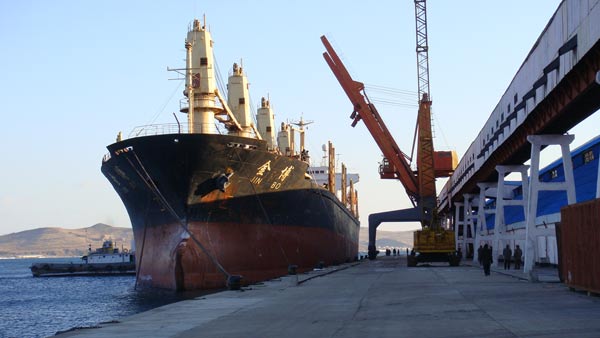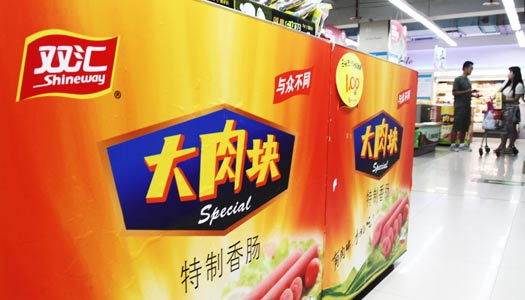Stronger links show countries mean business
Updated: 2012-09-21 07:32
 |
|
A Chinese cargo ship docked at Rason Port in the DPRK. Provided to China Daily |
New road to cooperation
Sources close to the Hunchun Information Office said that China and the DPRK will soon hold a ceremony to celebrate the opening of the Hunchun-Rason highway. The 50-km road, fully sponsored by China, is the major link between Jilin and the RETZ.
Moreover, China and the DPRK held a joint investment seminar for the two zones during the Changchun expo. "Cooperation has achieved remarkable results and has entered a new age because of the impetus provided by central and local governments on both sides," said Song Yaoming, deputy director of the Department of Asian Affairs at the Ministry of Commerce.
A senior official from Rason said the zone is updating its infrastructure and welcomes investors from home and abroad. The steering committee's leading officials were also unveiled for the first time at the seminar as Zhang Zhiqian from Liaoning province and Li Zicheng from Jilin were appointed deputy directors of the two zones.
Zhang told China Daily that overall planning of the Hwanggumphyong and Wihwa Islands Zone has been completed and the zone will focus on information, tourism and the culture industry. "Our aim is to build a labor-intensive economic zone," he said.
A large team from the DPRK will take part in the 2012 China-DPRK Trade Cultural and Tourism Expo to be held in Dandong, Liaoning province in October, according to Pan Shuang, the deputy mayor of the city.
Many enterprises have noted the opportunities and have started to invest in the region. China Communications Group, China Railway Construction Group, China Merchants Group, Yatai Group and other large enterprises are all planning to invest in the zones, according to the Jilin provincial government.
International feedback
International institutions and neighboring countries have expressed cautious optimism about the impact on regional prosperity and security.
"We expect the cooperation to bring not only prosperity but also regional security, with the DPRK further opening-up and participating in regional cooperation," said Choi Hoon, director of the United Nations Development Program Tumen Secretariat.
In 1991, the UNDP launched plans to set up an economic development zone in the Tumen River delta, which forms a 516-km-long border between China, Russia and the DPRK. The program was later upgraded to become the Greater Tumen Initiative, aiming to promote regional development and prosperity and security of the Asia-Pacific region.
Choi Hoon suggested that China and the DPRK begin cooperation in industries such as transport, construction and tourism industry, which could provide short-term benefits and enhance mutual understanding.
Xu Jingbo, president of Japan's Asia News Agency said that Japanese business community views the lines from Rason to the west coast of Japan with great interest. The distance between Changchun and Dalian is around 1,400 km and rail transportation is expensive, but Changchun to Hunchun is only around 700 km. Meanwhile, shipping costs could also be reduced as Rason is closer to Japan than Dalian.
"Northeast China could become a major agricultural supply base for Japan, for goods such as rice and potatoes. Changchun's Japanese auto companies could save a lot of time and cost if they switched from the current port at Dalian," said Xu.
A number of enterprises from home and abroad have already established a presence in the region, according to the Jilin government.
Korean Unphung Joint Venture Co, a joint venture between Korea Unpasan Trading Co and China's Liaoning Wellhope Agri-Tech Co, was founded in 2006 to produce a wide range of livestock feeds.
The cooperation has worked well so far, with sales reaching 18,720 metric tons, and joint assets worth $2.99 million by the end of 2011, according to Jin Weidong, chairman of Wellhope Agri-Tech.
Meanwhile, two corporate giants from the Republic of Korea, POSCO Group and Hyundai Group launched the Hunchun international logistics park project - located in the eastern outskirts of Hunchun - just 30 km from the Chinese-DPRK border on Sept 10.
"We expect it to serve as a hub connecting Northeast China with the ROK, Japan and Southeast China," said POSCO Group President Chung Joon-yang,
Industry insiders said the project is a strategic investment - its goal is not short-term profit but the chance to participate in the DPRK economy in the future.
"We have the potential to attract cargo from Jilin and Heilongjiang (province) that used to be transported via railway to Dalian," said Yu Xiaofeng, an official from Jilin's Yanbian Korean prefecture.
- BYD exports three electric cars to Thailand
- Grid gets first jolt of residential solar power
- US now largest buyer of China's exports
- China's outbound M&As on the rise
- Tobacco control may entail price, tax rises
- Quanzhou becomes pilot financial reform zone
- New automobiles shine at Geneva Motor Show
- World's longest high-speed rail 'on track'
- Jiugui Liquor involved in plasticizer scandal again
- Accident reignites school bus safety concerns
- China to revise labor law
- Trademark registration under scrutiny
- Dinner ban takes toll on liquor firms
- CIC tables bid for London's Chiswick Park
- Property buyers eye overseas market
- Call for law to protect personal information
- China to cut train ticket prices
- Christmas business
- Solar industry to get jolt from new policies
- KFC chicken under spotlight















